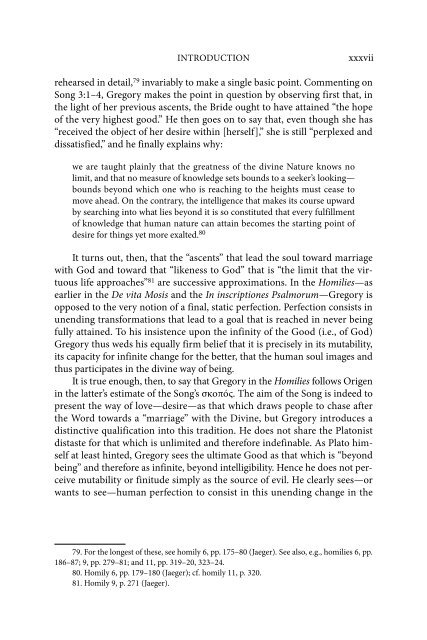gregory of nyssa: homilies on the song of songs - Society of Biblical ...
gregory of nyssa: homilies on the song of songs - Society of Biblical ...
gregory of nyssa: homilies on the song of songs - Society of Biblical ...
Create successful ePaper yourself
Turn your PDF publications into a flip-book with our unique Google optimized e-Paper software.
INTRODUCTION xxxvii<br />
rehearsed in detail, 79 invariably to make a single basic point. Commenting <strong>on</strong><br />
S<strong>on</strong>g 3:1–4, Gregory makes <strong>the</strong> point in questi<strong>on</strong> by observing first that, in<br />
<strong>the</strong> light <str<strong>on</strong>g>of</str<strong>on</strong>g> her previous ascents, <strong>the</strong> Bride ought to have attained “<strong>the</strong> hope<br />
<str<strong>on</strong>g>of</str<strong>on</strong>g> <strong>the</strong> very highest good.” He <strong>the</strong>n goes <strong>on</strong> to say that, even though she has<br />
“received <strong>the</strong> object <str<strong>on</strong>g>of</str<strong>on</strong>g> her desire within [herself],” she is still “perplexed and<br />
dissatisfied,” and he finally explains why:<br />
we are taught plainly that <strong>the</strong> greatness <str<strong>on</strong>g>of</str<strong>on</strong>g> <strong>the</strong> divine Nature knows no<br />
limit, and that no measure <str<strong>on</strong>g>of</str<strong>on</strong>g> knowledge sets bounds to a seeker’s looking—<br />
bounds bey<strong>on</strong>d which <strong>on</strong>e who is reaching to <strong>the</strong> heights must cease to<br />
move ahead. On <strong>the</strong> c<strong>on</strong>trary, <strong>the</strong> intelligence that makes its course upward<br />
by searching into what lies bey<strong>on</strong>d it is so c<strong>on</strong>stituted that every fulfillment<br />
<str<strong>on</strong>g>of</str<strong>on</strong>g> knowledge that human nature can attain becomes <strong>the</strong> starting point <str<strong>on</strong>g>of</str<strong>on</strong>g><br />
desire for things yet more exalted. 80<br />
It turns out, <strong>the</strong>n, that <strong>the</strong> “ascents” that lead <strong>the</strong> soul toward marriage<br />
with God and toward that “likeness to God” that is “<strong>the</strong> limit that <strong>the</strong> virtuous<br />
life approaches” 81 are successive approximati<strong>on</strong>s. In <strong>the</strong> Homilies—as<br />
earlier in <strong>the</strong> De vita Mosis and <strong>the</strong> In inscripti<strong>on</strong>es Psalmorum—Gregory is<br />
opposed to <strong>the</strong> very noti<strong>on</strong> <str<strong>on</strong>g>of</str<strong>on</strong>g> a final, static perfecti<strong>on</strong>. Perfecti<strong>on</strong> c<strong>on</strong>sists in<br />
unending transformati<strong>on</strong>s that lead to a goal that is reached in never being<br />
fully attained. To his insistence up<strong>on</strong> <strong>the</strong> infinity <str<strong>on</strong>g>of</str<strong>on</strong>g> <strong>the</strong> Good (i.e., <str<strong>on</strong>g>of</str<strong>on</strong>g> God)<br />
Gregory thus weds his equally firm belief that it is precisely in its mutability,<br />
its capacity for infinite change for <strong>the</strong> better, that <strong>the</strong> human soul images and<br />
thus participates in <strong>the</strong> divine way <str<strong>on</strong>g>of</str<strong>on</strong>g> being.<br />
It is true enough, <strong>the</strong>n, to say that Gregory in <strong>the</strong> Homilies follows Origen<br />
in <strong>the</strong> latter’s estimate <str<strong>on</strong>g>of</str<strong>on</strong>g> <strong>the</strong> S<strong>on</strong>g’s σκοπός. The aim <str<strong>on</strong>g>of</str<strong>on</strong>g> <strong>the</strong> S<strong>on</strong>g is indeed to<br />
present <strong>the</strong> way <str<strong>on</strong>g>of</str<strong>on</strong>g> love—desire—as that which draws people to chase after<br />
<strong>the</strong> Word towards a “marriage” with <strong>the</strong> Divine, but Gregory introduces a<br />
distinctive qualificati<strong>on</strong> into this traditi<strong>on</strong>. He does not share <strong>the</strong> Plat<strong>on</strong>ist<br />
distaste for that which is unlimited and <strong>the</strong>refore indefinable. As Plato himself<br />
at least hinted, Gregory sees <strong>the</strong> ultimate Good as that which is “bey<strong>on</strong>d<br />
being” and <strong>the</strong>refore as infinite, bey<strong>on</strong>d intelligibility. Hence he does not perceive<br />
mutability or finitude simply as <strong>the</strong> source <str<strong>on</strong>g>of</str<strong>on</strong>g> evil. He clearly sees—or<br />
wants to see—human perfecti<strong>on</strong> to c<strong>on</strong>sist in this unending change in <strong>the</strong><br />
79. For <strong>the</strong> l<strong>on</strong>gest <str<strong>on</strong>g>of</str<strong>on</strong>g> <strong>the</strong>se, see homily 6, pp. 175–80 (Jaeger). See also, e.g., <str<strong>on</strong>g>homilies</str<strong>on</strong>g> 6, pp.<br />
186–87; 9, pp. 279–81; and 11, pp. 319–20, 323–24.<br />
80. Homily 6, pp. 179–180 (Jaeger); cf. homily 11, p. 320.<br />
81. Homily 9, p. 271 (Jaeger).
















